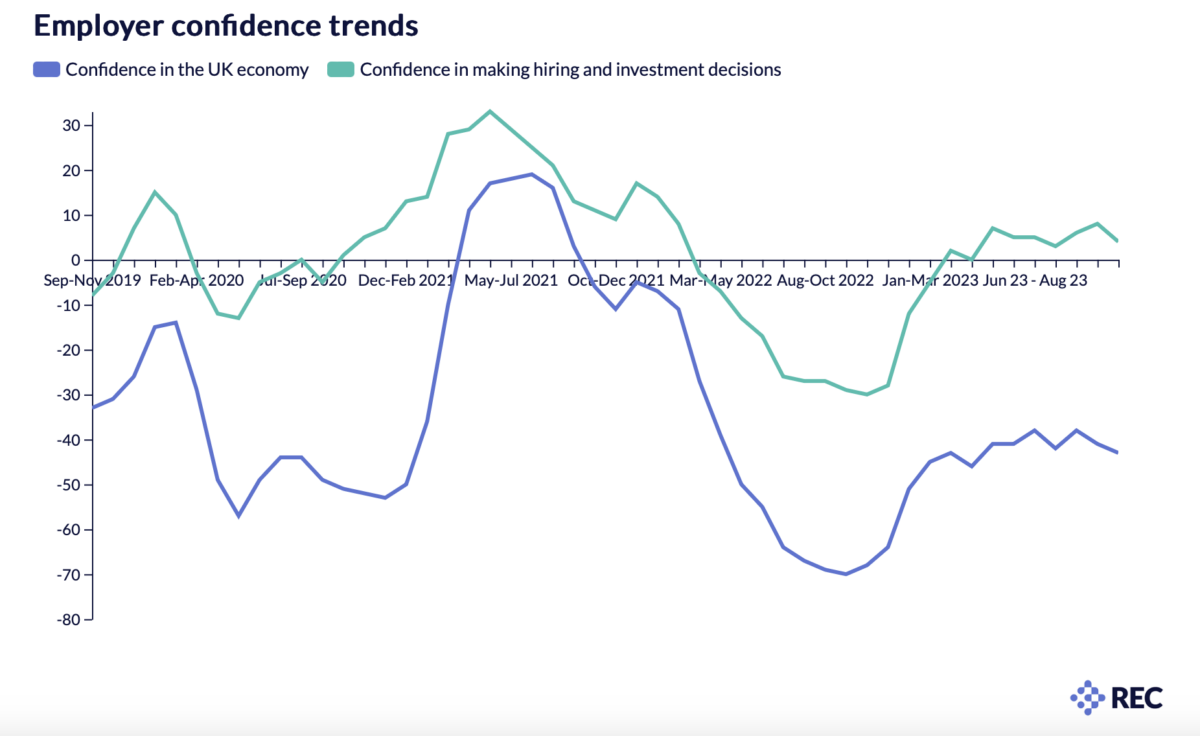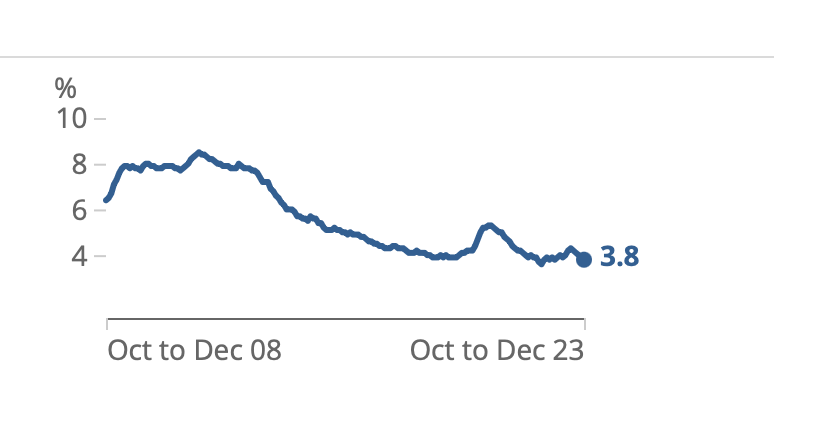
As we step into the heart of February, this month, we ask a pressing question: “Are Hiring Algorithms Leaving Humanity Behind?” As AI’s role in recruitment grows, evidenced by a 23% uptick in adoption this past year, we examine the critical balance between automation and the irreplaceable human touch.
But first, an exploration of the latest stats and stories from the recruitment frontlines, where our approach continues to make meaningful connections in an increasingly data-driven world.
The most recent Report on Jobs survey by KPMG and REC, produced by S&P Global, signals that the uncertain economic climate is still influencing hiring at the year’s outset. For the past five months, overall job vacancies have seen a gradual decline.
Recruitment slowdown and job cuts have led to more available workers. The rise in candidate numbers for both permanent and temporary roles has slowed since December. Despite this, the competition for skilled workers and inflationary pressures have driven up starting salaries, although the rate of salary and wage growth remains below historical averages.

Balancing Act: Stability and Growth in the Temporary Job Market Amid Economic Uncertainty
At present, the labour market is at a crossroads with the broader economy. Despite this, the job market has shown remarkable strength, particularly in the temporary work sector, which has seen significant growth for three years running. This growth has been instrumental in maintaining high employment levels as businesses adjust to shifts in competition and technology. The strength observed in permanent job roles aligns with observations from REC members, suggesting that the job market may be recovering.

Recent ONS Figures
- The UK employment rate (75.0%) remains below estimates a year ago (October to December 2022), but has increased in the latest quarter.
- The UK unemployment rate (3.8%) decreased in the latest quarter, returning to the rate a year ago (October to December 2022).
- The UK economic inactivity rate (21.9%) is above estimates a year ago (October to December 2022), but was largely unchanged in the latest quarter.
The Recruitment and Employment Confederation (REC) survey indicates that 70% of UK employers are experiencing a scarcity of candidates for a variety of roles.
Over 80% of small businesses participating in the survey, specifically those with fewer than 50 employees, have reported a candidate shortage, standing at 81.5%. This persists despite a year marked by slower economic expansion and a reduction in hiring, highlighting a persistent difficulty in the UK job market to fulfil the demand for employees. Addressing these persistent shortages of candidates is a significant challenge for policymakers and employers, especially if the economy begins to grow again this year. Furthermore, 57.1% of medium-sized businesses (with 50-249 employees) and two-thirds of larger companies (employing more than 250 people) also report not finding enough candidates, indicating widespread challenges across businesses of all sizes, although they may be better equipped to find solutions.
The job market has undergone a fundamental shift, even against a backdrop of sluggish economic growth. 9.5% of companies are seeking the assistance of temps, freelancers, and contractors. Nonetheless, the role of recruitment agencies in providing temporary staff and pioneering new methods for filling permanent positions is crucial for businesses to meet their immediate staffing needs.
For small businesses, in particular, a proficient recruitment partner is indispensable, no longer a luxury. These partners are valuable not just for their specialist skills but also for their ability to tap into new candidate pools and offer flexible, innovative hiring solutions. Businesses need to realise that the value derived from investing in recruitment services far outweighs the cost-saving approach. Opting for the cheapest recruitment options can often lead to suboptimal outcomes.
Are Hiring Algorithms Leaving Humanity Behind? Why You Need the Human Edge in Recruitment
In an age where ‘Rise of the Machines?’ is not just a cinematic trope but a tangible concern, it’s essential to evaluate the impact of AI and data-driven technologies in our professional lives. At Citrus Connect Recruitment, we acknowledge the advancements in AI that have transformed recruitment but also recognise the irreplaceable value of the human touch.

The recruitment landscape is increasingly adopting AI to streamline hiring processes. However, there’s a growing unease about an over-reliance on algorithms, which often lack the subtlety and discernment of human interaction. A report from the Recruitment & Employment Confederation (2021) highlighted that 88% of candidates felt their skills were better communicated in person rather than through an AI screening tool. Furthermore, concerns about AI bias in recruitment are not unfounded, with numerous studies indicating that unchecked algorithms can perpetuate biases, inadvertently filtering out qualified candidates based on flawed criteria.
At Citrus Connect, we champion a human-centric approach. A recent example is our work with E-Tech Industries, where a data-driven tool overlooked a candidate for a leadership role due to a career gap. Our team’s engagement revealed the gap was due to a sabbatical for professional development, which made the candidate uniquely suited for the role. It’s such insights that algorithms can miss but are key to finding the right fit.
Our ethos is about balance – leveraging technology for efficiency while ensuring ethical HR tech solutions. We believe in technology as a tool, not a replacement. Our commitment to personalised touch, cultural fit assessment, and expert guidance has led to a 95% retention rate for placed candidates, a testament to the efficacy of the human edge.
In our pursuit of excellence, we also provide our clients with tips on selecting ethical HR tech solutions that prioritise transparency and fairness. We encourage businesses to consider the human narrative behind each CV, and the story behind the data.
As we navigate this new era, the question remains: can we afford to ignore the human element in recruitment?
The simple answer is no. The human edge isn’t just about avoiding the pitfalls of bias; it’s about enriching our workplaces with diverse, multifaceted individuals who drive innovation and growth.
At Citrus Connect, we stand firmly at the forefront of ethical recruitment, ensuring that humanity isn’t just a buzzword but the cornerstone of our practice.
To Your Continued Success,

Leena Parmar, Founder, Citrus Connect Recruitment




